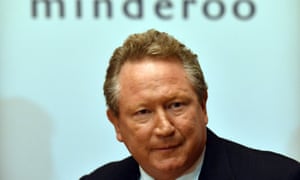Mining billionaire’s initiative would see manufacturers of virgin plastic pay premium for doing so

Mining billionaire Andrew “Twiggy” Forrest is launching a business-driven initiative to try to tackle the hundreds of millions of tonnes of plastic waste produced every year around the globe.
Forrest, through his Minderoo Foundation, is committing US$300m to launch the scheme that proposes manufacturers of fossil-fuel based plastic pay a voluntary financial contribution for doing so.
The rate would not be payable on recycled plastics, which he hopes could drive the transition to use of recycled plastics in production and stem the flow of waste into the world’s oceans and terrestrial spaces.
Forrest has a long-standing interest in oceans and is a candidate for a PhD in marine ecology.
He believes if major resin producers sign up to his proposal, the initiative – called Sea the Future – could raise US$20bn annually for global recycling, collection and environmental measures.
“There’s 7.5 billion people who consume plastic,” Forrest said.
“They get that plastic distributed to them by tens of thousands of brands, from building products to fast-moving consumer goods like Coca-Cola [and] Nestlé.
“But there’s only really around 100 major resin producers for petrochemical/oil and gas companies who make plastic resin that need to come on side and that is manageable number.”
Forrest said he had travelled the globe talking to major manufacturers of plastics while he was developing the proposal.
He said a voluntary contribution for fossil fuel-based plastics would start at US$200 per tonne and, for the most difficult to recycle plastics, could be up to US$5,000 per tonne.
He believes transitioning to a circular economy that limits the production of single-use plastic and creates an end-use for plastic waste that is currently being discarded into the environment is an opportunity for big businesses.
“If they elevate the price of bad plastic or fossil fuel plastic, then instantly what becomes commercial is all the plastic in the world which is currently known as waste,” Forrest said.
He said such a scheme could also have an impact in reducing the climate footprint of the global plastics industry by decoupling it from fossil fuels.
Forrest’s US$300m commitment consists of $40m in startup capital and $1m per week for 260 weeks for a global body that would independently audit the scheme and funds raised from it.
He did not say whether any major companies had said they would sign up to pay a voluntary contribution.
But he said major producers and users of plastics in the global supply chain such as the Coca-Cola Company, Walmart and Unilever had responded positively to the initiative.
“The protection of our oceans is fundamental to the preservation and flourishing of life on Earth,” Alan Jope, the chief executive of Unilever PLC said.
“At Unilever we are committed to ending ocean plastic and we welcome cross-industry initiatives, like the Minderoo Foundation’s, that is looking across the value chain to identify scalable solutions.”
Forrest’s announcement comes as the Australian prime minister, Scott Morrison, prepares to address the United Nations on Wednesday. Plastic pollution and the need for greater global recycling efforts are expected to be a key focus of the speech.
But Australia has come under scrutiny for its apparent rejection of the need to do more to address the global climate crisis and failure to lay out ambitious targets towards net zero emissions.
Morrison was not present at the UN climate summit this week and on Wednesday said debate about climate change was subjecting children to “needless anxiety”.
Forrest said he would not be drawn into commenting on politics and government responses to environmental issues.
“I believe in [anthropogenic] climate change,” he said. “I believe we must do everything in our power to reduce its impact and ultimately reverse it. But I’m not going to comment on policies of governments, even my own.”








